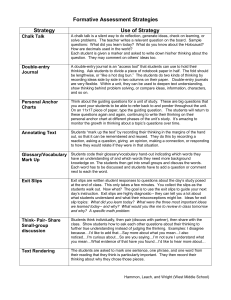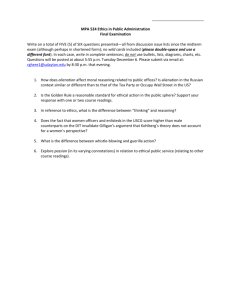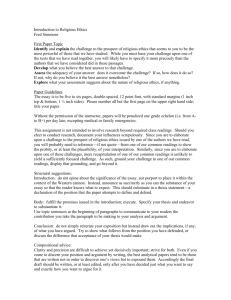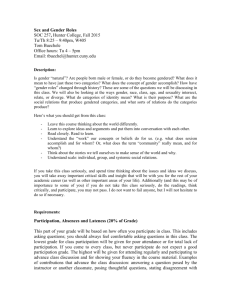PHL 295 Business Ethics (Three Credit Hours) Instructor: Mark
advertisement
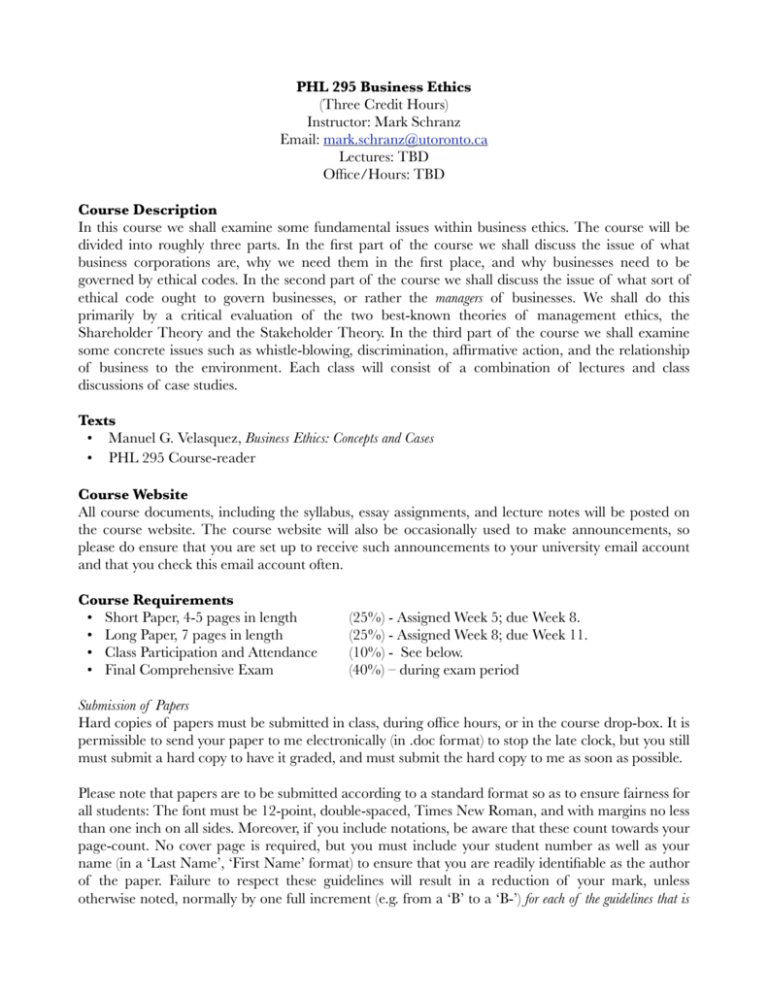
PHL 295 Business Ethics (Three Credit Hours) Instructor: Mark Schranz Email: mark.schranz@utoronto.ca Lectures: TBD Office/Hours: TBD Course Description In this course we shall examine some fundamental issues within business ethics. The course will be divided into roughly three parts. In the first part of the course we shall discuss the issue of what business corporations are, why we need them in the first place, and why businesses need to be governed by ethical codes. In the second part of the course we shall discuss the issue of what sort of ethical code ought to govern businesses, or rather the managers of businesses. We shall do this primarily by a critical evaluation of the two best-known theories of management ethics, the Shareholder Theory and the Stakeholder Theory. In the third part of the course we shall examine some concrete issues such as whistle-blowing, discrimination, affirmative action, and the relationship of business to the environment. Each class will consist of a combination of lectures and class discussions of case studies. Texts • Manuel G. Velasquez, Business Ethics: Concepts and Cases • PHL 295 Course-reader Course Website All course documents, including the syllabus, essay assignments, and lecture notes will be posted on the course website. The course website will also be occasionally used to make announcements, so please do ensure that you are set up to receive such announcements to your university email account and that you check this email account often. Course Requirements • Short Paper, 4-5 pages in length • Long Paper, 7 pages in length • Class Participation and Attendance • Final Comprehensive Exam (25%) - Assigned Week 5; due Week 8. (25%) - Assigned Week 8; due Week 11. (10%) - See below. (40%) – during exam period Submission of Papers Hard copies of papers must be submitted in class, during office hours, or in the course drop-box. It is permissible to send your paper to me electronically (in .doc format) to stop the late clock, but you still must submit a hard copy to have it graded, and must submit the hard copy to me as soon as possible. Please note that papers are to be submitted according to a standard format so as to ensure fairness for all students: The font must be 12-point, double-spaced, Times New Roman, and with margins no less than one inch on all sides. Moreover, if you include notations, be aware that these count towards your page-count. No cover page is required, but you must include your student number as well as your name (in a ‘Last Name’, ‘First Name’ format) to ensure that you are readily identifiable as the author of the paper. Failure to respect these guidelines will result in a reduction of your mark, unless otherwise noted, normally by one full increment (e.g. from a ‘B’ to a ‘B-’) for each of the guidelines that is not respected. Failure to adhere to the prescribed page limits for papers may also result in additional reductions of your mark. Late Papers Papers are due at the beginning of the lecture on the day that they are due. (Please note: for those submitting papers electronically so as to stop the late clock, you must have submitted in by the beginning of lecture for it to count as on time.) Late papers will be penalized 3% per day, including weekends. Extensions will only be permitted because of illness, bereavement, or other extraordinary and unforeseeable circumstances. Documentation will be required. Class Participation and Attendance The grade for class participation and attendance will be partly determined through the use of ‘exit slips’ and according to the quality of the student’s participation in class discussions. Under normal circumstances, 5% of the total grade will determined by exit slips and 5% of the total grade will be determined by participation in class discussion. Exit Slips: • For each of lectures 2-11, each student will, before exiting the class, submit to the professor an ‘exit slip’. The student must write their name and the date on the exit slip as well as a brief comment about the material covered in lecture that day. Such comments may address an issue discussed in the lecture that the student feels they did not fully understand (and explain why they did not understand it), or ask a question about broader implications of the material covered in class, and so forth. Time will be taken at the beginning of the subsequent lecture to address selected comments that appear on these exit slips (especially those that identify issues that students feel they did not fully understand). • Time will be allotted at the end of each lecture for filling out exit slips (approximately 10 minutes). The Instructor will provide the paper required for filling out the slips. • Exit slips must be submitted in class; they cannot be emailed after class. • Exit slips can also be submitted at the mid-class break if you need to leave early, but please be aware that I will keep track of slips that are submitted early. For every two early-submitted exit slips, you get half credit for both slips (so 9 regular slips plus 1 early slip = 10 slips worth of credit, but 8 regular slips plus 2 early slips = only 9 slips of credit) • Exit slips must be submitted individually by each student. No credit will be given for improperly submitted exit slips. E-mail Policy I will attempt to respond to all valid e-mail inquiries within 24-48 hours during the work week. Valid e-mail inquiries do not include questions about course information that is easily accessible through the course website, questions about the content of missed lectures, or substantive philosophical questions. The latter two sorts of questions are better addressed during lectures or during office hours. Please note that teaching assistants will not answer e-mails. Classroom Etiquette / Behavior The general rule for behavior in the classroom is to behave in a way that is respectful to your professor and, more importantly, to your fellow students. We will (hopefully) have a lot of discussion in the class about (somewhat) controversial philosophical issues. You are encouraged to engage in class discussions and are welcome to argue for whatever viewpoint you think is correct. But in doing so you must keep two things in mind: First, in class discussions (and more generally in philosophy) you have to argue for your view and not just assert it. Second, if you disagree with someone else, you are welcome to critique / attack their view / argument but you are not welcome to critique / attack the person holding that view / argument; if you attack the person rather than the argument, you will be instructed to cease or, in extreme cases, will be asked to leave the classroom and may even forfeit participation marks. Being respectful to others in the classroom also means that you must do you best not to distract others. You are welcome to eat and drink in class. Sending text messages while in class is strongly discouraged. Carrying on private conversations with other students during class must be kept to an absolute minimum. Talking on the phone while in class is absolutely unacceptable. You may be asked to leave the classroom if your activities are overly distracting to your fellow students. Plagiarism Plagiarism is a serious academic offense and will not be tolerated. The penalties for plagiarism can be very severe, and will be enforced should cases of it arise in this course. The University defines plagiarism and related academic offenses as follows: “to represent as one’s own any idea or expression of an idea or work of another in any academic examination or term test or in connection with any other form of academic work”, “to submit, without the knowledge and approval of the instructor to whom it is submitted, any academic work for which credit has previously been obtained or is being sought in another course or program of study in the University or elsewhere”, and “to submit any academic work containing a purported statement of fact or reference to a source which has been concocted”. To avoid plagiarism, you must ensure that your sources are properly cited and documented. For more information on plagiarism and the university’s code of academic behavior, consult me during my office hours, or see: http://www.governingcouncil.utoronto.ca/policies/behaveac.htm Turnitin.com Students agree that by taking this course all required papers may be subject to submission for textual similarity review to Turnitin.com for the detection of plagiarism. All submitted papers will be included as source documents in the Turnitin.com reference database solely for the purpose of detecting plagiarism of such papers. The terms that apply to the University’s use of the Turnitin.com service are described on the Turnitin.com web site. Further details about how to submit papers for this course to Turnitin.com will be made available by the time that the first essay topics are assigned. Please note that submitting your paper to Turnitn.com does not stop the late clock, unless otherwise noted. You must submit an electronic copy directly to me if you wish to stop the late clock. Office Hours There will be regular office hours for this class every week. Additionally, each of the weeks that a paper is due, there will be special office hours to deal with these concerns. Office hours are also available by appointment. Letters of Support / Recommendation If you require a letter of recommendation from me (for applications to law school and so forth) please be aware that I am happy to provide them. Don't be afraid to approach me about issues such as this. However, you should be aware that it is best to ask for letters of recommendation toward the end of the semester; asking me earlier in the semester makes it difficult for me to make an informed judgement about the strength of the letter that I'll be able to write for you. Lectures and Reading Schedule: Lecture 1 Introduction To Course and Major Themes Readings: None. Lecture 2 Why Hierarchy? Readings: (1) (2) (3) Miller, G. J., ‘Market Failures and Hierarchical Solutions: The Tension Between Individual and Social Rationality’. Coase, R.H., ‘The Nature of the Firm,’ Economica Vol.4, No. 16 (1937), pp. 386-405. Case Study / Discussion: TBA Why Business Ethics? Readings: (1) (2) (3) Noreen, E., ‘Economics of Ethics: A New Perspective on Agency Theory,’ Accounting, Organizations and Society 13 (1988): pp.359-369. Buchannan, A., ‘Toward a Theory of the Ethics of Bureaucratic Organizations,’ Business Ethics Quarterly 6 (1996): pp. 419-440. Case Study / Discussion: TBA Lecture 3 Lecture 4 Shareholder and Stakeholder I Readings: (1) Friedman, M., ‘The Social Responsibility of Business is to Increase its Profits’ from New York Times Magazine, Sept. 13, 1970. (2) Freeman, R.E., ‘The Stakeholder Theory of the Modern Corporation,’ from Ethical Theory and Business, Prentice-Hall, Inc. (1994): pp. 66-76. (3) Case Study / Discussion: TBA Lecture 5 Shareholder and Stakeholder II Readings: (1) Mulligan, T., ‘A Critique of Milton Friedman’s Essay,’ Journal of Business Ethics 5 (1986): pp. 265-269. (2) Goodpaster, K.E., ‘Business Ethics and Stakeholder Analysis,’ Business Ethics Quarterly 1 (1991): pp. 53-73. (3) Case Study / Discussion: TBA Lecture 6 Shareholder and Stakeholder III Readings: (1) Boatright, J.R., ‘What’s Wrong – and What’s Right – with Stakeholder Management’ from Journal of Private Enterprise 21 (2) Stanford University Press (2006) (2) Heath, J., ‘Business Ethics without Stakeholders,’ Business Ethics Quarterly 16(3) (2006): pp. 533-557. (3) Case Study / Discussion: TBA Lecture 7 Cost Benefit Analysis and Rights Readings: (1) Velasquez pp. 60-68, 296-99. (2) Stevenson, J.T. “Cost-Benefit Studies”, Chapter 13 of Engineering Ethics: Practices and Principles, Canadian Scholars’ Press, Toronto, Ontario (1987, repr. 1990) pp.271-299. (3) Alan Gewirth, “Human Rights and the Prevention of Cancer,” American Philosophical Quarterly 17(2): 117-125 (1980) (4) Case Study / Discussion: TBA Lecture 8 Business and the Environment Readings: (1) Velasquez, Chapter 5 (2) Schrecker, T., ‘Risks versus Rights: Economic Power and Economic Analysis in Environmental Politics,’ (3) Case Study / Discussion: TBA Lecture 9 Responsibility for Disasters and Whistleblowing Readings: (1) Velasquez, pp. 41-51, 377-80. (2) John Bishop, “The Moral Responsibility of Corporate Executives for Disasters”, Journal of Business Ethics 10: 377-383 (1991). (3) Frederick Elliston, “Anonymity and Whistleblowing”, Journal of Business Ethics 1(3): 167-177 (1982). (4) Case Study / Discussion: TBA Lecture 10 Discrimination and Affirmative Action I Readings: (1) Velasquez, Chapter 7 (2) David Miller, “Deserving Jobs,” from Principles of Social Justice, Harvard University Press, Cambridge, Mass. (1999): pp. 156-176, 306-312. (3) Case Study / Discussion: TBA Lecture 11 Discrimination and Affirmative Action II Readings: (1) Narveson, J. ‘Have We a Right to Non-Discrimination?’ (2) Young, I.M., “Affirmative Action and the Myth of Merit,” from Justice and the Politics of Difference, Princeton University Press, Princeton, N.J. (1990) pp. 192-225. (3) Case Study / Discussion: TBA Lecture 12 TBD
